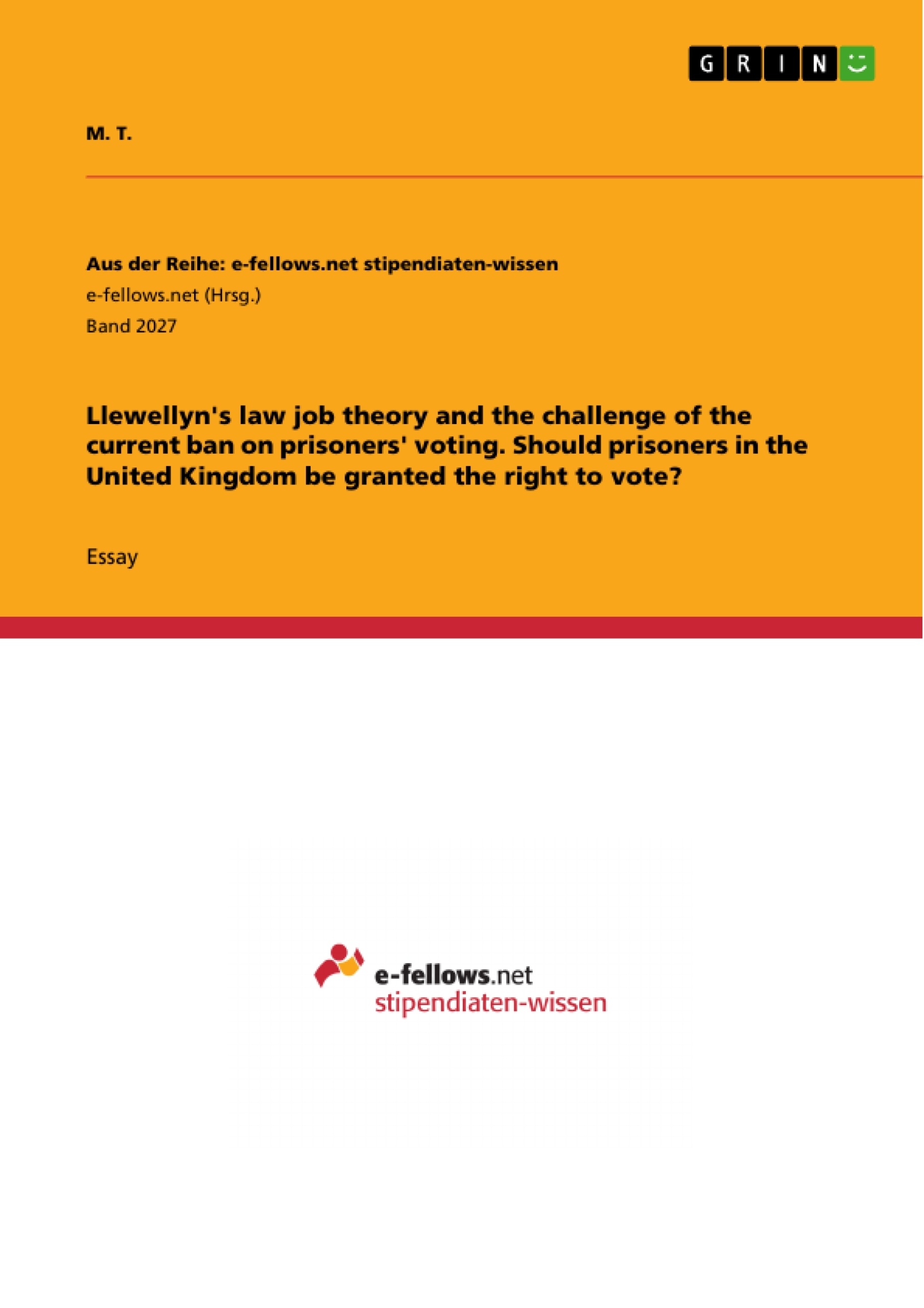The aim of this essay is to work out and comment upon the treatment of prisoner voting rights by different instruments and the respective authorities on the basis of the parliamentary briefing paper dated from 11 February 2015 with particular consideration of the implementation of Llewellyn’s law jobs. First, this essay will present Llewellyn’s law job theory, then it will outline general provisions relating to voting rights. In the next section, the ECtHR’s and the UK government’s point of view on this debate will be critically examined, followed by an evaluation referring to the operation of the law jobs, especially emphasizing tensions regarding the resolution of trouble cases and the guiding of people’s conduct.
Should prisoners in the United Kingdom be granted the right to vote? Several cases – Hirst v The United Kingdom (No 2) probably being the most popular example, where the convicted sought to challenge the current ban on prisoners’ voting – raised this issue in the recent years. A highly controversial debate was thereby initiated, especially against the backdrop of frequently arising tensions between the UK and the European Court of Human Rights (ECtHR) as to the nature and extent of how some substantive rights operate. Since the Human Rights Act 1998 incorporates the rights contained in the European Convention on Human Rights (ECHR) into the law of the UK, the national courts are generally obliged to interpret national law in a manner compatible with the ECHR and to consider the decisions of the ECtHR .
Inhaltsverzeichnis (Table of Contents)
- I. Should prisoners in the United Kingdom be granted the right to vote?
- II.
- 1. Llewellyn's law job theory
- 2. General provisions relating to voting rights
- a. UK law
- b. European law
- 3. Treatment of prisoner voting rights by several authorities
- a. ECtHR
- b. UK government
- 4. Evaluation
- III.
- IV. Reference list
- 1. Cases
- 2. Legislation
- 3. Publications by Parliament
- 4. Articles
- 5. Books
- 6. Websites
Zielsetzung und Themenschwerpunkte (Objectives and Key Themes)
This essay aims to analyze the treatment of prisoner voting rights by different instruments and authorities, particularly in the context of Llewellyn's law jobs, based on a parliamentary briefing paper. It examines the ECtHR's and the UK government's perspectives on prisoner voting rights, emphasizing the tensions arising from their different approaches.
- Llewellyn's law job theory and its application to prisoner voting rights
- Contrasting legal frameworks for prisoner voting rights in the UK and Europe
- The ECtHR's stance on prisoner voting rights and its impact on UK law
- The UK government's position on prisoner voting rights and its efforts to balance legal obligations with policy goals
- The potential implications of the UK government's reluctance to comply with the ECtHR's rulings on prisoner voting rights
Zusammenfassung der Kapitel (Chapter Summaries)
The essay begins by introducing Llewellyn's law job theory, highlighting its relevance to understanding the functioning of law in society. It then outlines the general provisions relating to voting rights in the UK and Europe, emphasizing the contrasting approaches of these jurisdictions. The essay further examines the ECtHR's and the UK government's positions on prisoner voting rights, analyzing their respective interpretations of the ECHR and the tensions arising from their differing viewpoints. Finally, the essay concludes by evaluating the current situation, considering the arguments for and against granting voting rights to prisoners and the implications of the UK government's reluctance to comply with the ECtHR's rulings.
Schlüsselwörter (Keywords)
The key themes and concepts explored in this essay include prisoner voting rights, the European Convention on Human Rights, the Human Rights Act 1998, the European Court of Human Rights, Llewellyn's law jobs, parliamentary sovereignty, and the tension between national and supranational law.
Frequently Asked Questions
Should prisoners in the UK be granted the right to vote?
This is a highly controversial debate involving tensions between UK national law, which generally bans prisoner voting, and the European Court of Human Rights (ECtHR), which views a blanket ban as a violation of human rights.
What is Llewellyn’s law job theory?
Llewellyn’s theory identifies fundamental tasks that law must perform in any society, such as resolving "trouble cases," guiding conduct, and allocating authority to maintain social order.
What was the significance of the Hirst v The United Kingdom case?
This landmark case challenged the UK's blanket ban on prisoner voting. The ECtHR ruled that such a general restriction was disproportionate and incompatible with the European Convention on Human Rights.
How does the Human Rights Act 1998 affect this issue?
The Act incorporates the European Convention on Human Rights into UK law, requiring national courts to interpret domestic legislation in a way that is compatible with Convention rights as far as possible.
Why is the UK government reluctant to comply with the ECtHR on this matter?
The government often cites parliamentary sovereignty and public policy goals, arguing that the right to vote is a privilege that should be forfeited upon committing a serious crime.
What are "trouble cases" in the context of prisoner voting?
In Llewellyn's terms, "trouble cases" are disputes that challenge the legal system's ability to resolve conflict. The prisoner voting debate is a classic trouble case involving a clash between national sovereignty and supranational human rights standards.
- Arbeit zitieren
- M. T. (Autor:in), 2016, Llewellyn's law job theory and the challenge of the current ban on prisoners' voting. Should prisoners in the United Kingdom be granted the right to vote?, München, GRIN Verlag, https://www.grin.com/document/337103



